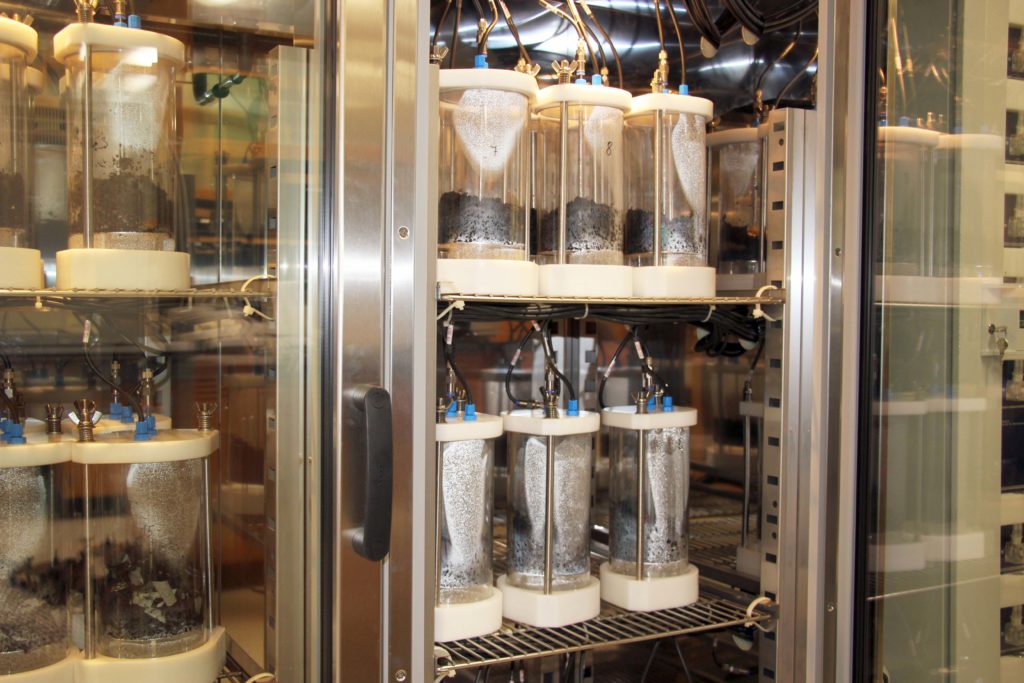The Bioseniatic℠ Laboratory

What is the Bioseniatic℠ Laboratory?
The Bioseniatic℠ Laboratory at the UGA New Materials Institute is an analytical laboratory which provides you and your customers with proof that what you claim happens to your materials and/or product at the end of its useful life really happens. Our analyses will tell you how long it takes your material or product to degrade into a natural state and in what receiving environment.
The BioseniaticSM Laboratory is available to test materials and/or products currently in development or in use, from any manufacturer or researcher. We specifically aim to test materials and/or products which possess the chemical and structural characteristics that afford a high chance of at least 90% conversion to biogases, water, or non-toxic compounds in reasonable time frames in simulated managed or mismanaged environments.
We help our clients design experiments that logically test variables in polymer structure or resin components that may influence the ability for a polymer to mineralize under a variety of conditions. We offer small sample modified respirometry testing that includes but is not limited to ASTM D5338, ASTM 5988, ASTM D6868, ASTM D6691, and ASTM D5271. We also offer gravimetric disintegration (ISO 20200); germination and toxicity (OECD/OCDE 208); disintegration photography; and elemental and heavy metal analysis. Our laboratory is not ISO accredited for these tests. Click here to contact us for more information.
What is a Bioseniatic™ material or product?
Leadership in the UGA New Materials Institute coined the term “Bioseniatic™” to describe a new generation of biologically degradable materials and/or products that are consumed by microbes in the receiving environment. Bioseniatic™ materials and products may come from nature or be synthetic, but regardless of their source, all are microbially degraded and non-toxic, which makes them safe for animals, people and our planet. A material or product must meet the following criteria to be a Bioseniatic™ material or product:
Naturally-sourced or synthetically-derived polymers with no additives or chemical modifications to their structure that prevent them from being biologically converted into a non-polymeric form of naturally occurring, non-toxic compounds at a rate congruous with natural analogues.
The post-consumer product must not promote the formation of intentional or persistent micro- or nanoparticles.
Consumed by microbes—even in your yard
A Bioseniatic™ material or product is one that will be consumed by microbes in water or on land—even in your backyard. The most important variable is the speed at which it is consumed, as warmer environments have faster microbial degradation rates than do colder environments. Bioseniatic™ materials and products will disappear with time—meaning no micro- or nano-sized particles or toxic residues have been left behind in the environment. How do we know this? Because as part of our analyses, after we conduct microbial digestion tests, we examine the test media in the respirometry chamber for micro- and nano-sized particles and chemical residue.
The gold standard for assessing safety
The Bioseniatic℠ Laboratory’s goal is to set the gold standard for assessing the safety of biologically degradable materials and products. We feel this is imperative for protecting the integrity of this unique class of materials designed to replace environmentally persistent petroleum-derived plastics and other environmentally persistent materials, as well as the researchers and companies inventing them. We encourage unique identification of the materials and products that meet our Bioseniatic™ criteria, so consumers can be confident that what they have purchased will really biologically degrade into a natural state and leave no unintended negative consequences on our environment.
Click here to review our Research Facilities and Equipment.
Know your impact!
We offer germination studies, conducted after respirometery studies, to assess a material’s impact on soil and plant health. We follow the OECD/OCDE 208 guidelines to evaluate seedling emergence and growth.
Click here to watch a video and learn more about our germination studies.
More questions?
Do you have more questions about our laboratory or its services? Click here for some Frequently Asked Questions (FAQs) about our Bioseniatic℠ Laboratory.
